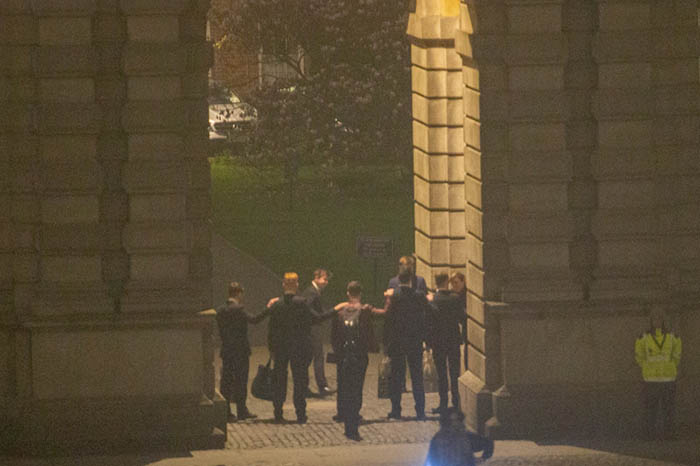[vc_row][vc_column][vc_column_text]

Trinity College, Knights of the Campanile initiation ceremony. Credit: Eleanor O’Mahony, The University Times
UPDATE: Some 74 per cent of students voted against slashing the funding of The University Times at Trinity College, Dublin.
A student newspaper at Ireland’s oldest university, Trinity College, Dublin, could face closure after a forthcoming student referendum due to a row over methods used to investigate a story about initiation into an elitist all-male college society.
The initiation ceremony, or “hazing”, was seemingly meted out to those invited to become members of the Knights of the Campanile, an invitation-only sporting society, based on similar bodies at Oxford and Cambridge universities.
The story was published in The University Times, a student union-funded, though independent newspaper, last month. The story, Knights of the Campanile Hazes Members on Campus, went on to say that reporters from the newspaper had witnessed an initiation ceremony for the elite invitation-only society. It claimed members were taken to the rooms of the society president, while the reporters listened outside and left a recording device outside the door. The reporters heard the potential members being jeered, taunted and told to “bend over”, “get in the shower” to “whisper insults in each others’ ears” and that “HIV is going on your toast tomorrow”.
Groaning, gagging and retching sounds were heard coming from the room. Members were told “it’s gonna be a long night, boys” before being driven away in rental cars.
There was an almost instant condemnation of the methods used rather than the society and the hazing allegation, including from the rival newspaper, Trinity News, which called for the resignation of the editor and said the methods were contrary to journalistic ethics. A petition calling for the newspaper to be defunded, which would almost certainly close it, was also initiated.
However, the story grew. The NUJ’s Ethics Council came out in support The University Times, whose staff are student members of the union, and the International Federation of Journalists described the attempted closure as an attack on press freedom. The university’s School of Law is split, with three professors highlighting the inviolability of the dwelling in the Constitution of Ireland, which the journalists are meant to have breached. Their colleague, professor Eoin O’Dell, defended the newspaper, its reporters and their methods, based on a public interest defence that trumped privacy and was justified by the public interest and the importance of the story. Michael McDowell, Ireland’s former Attorney General and former Minister for Justice, argued at a public meeting at Trinity that the public interest and the guarantees of a free press in the constitution were enough to protect the newspaper and its ethical behaviour.
Another solution, which was not taken up, was that instead of threatening a newspaper with closure, the issue should be taken to the Irish Press Council for adjudication, as both student newspapers are members.
The same newspaper had previously published a story concerning hazing by the college boat club.
The referendum will take place on 10 and 11 April.[/vc_column_text][/vc_column][/vc_row][vc_row][vc_column][vc_basic_grid post_type=”post” max_items=”4″ element_width=”6″ grid_id=”vc_gid:1555078636454-225c0bbf-fd09-5″ taxonomies=”8843″][/vc_column][/vc_row]




